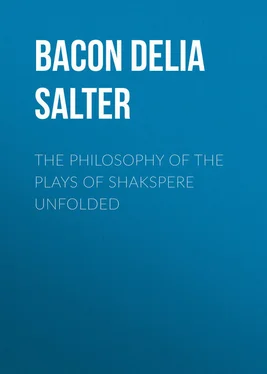Delia Bacon - The Philosophy of the Plays of Shakspere Unfolded
Здесь есть возможность читать онлайн «Delia Bacon - The Philosophy of the Plays of Shakspere Unfolded» — ознакомительный отрывок электронной книги совершенно бесплатно, а после прочтения отрывка купить полную версию. В некоторых случаях можно слушать аудио, скачать через торрент в формате fb2 и присутствует краткое содержание. Жанр: literature_19, foreign_antique, foreign_prose, на английском языке. Описание произведения, (предисловие) а так же отзывы посетителей доступны на портале библиотеки ЛибКат.
- Название:The Philosophy of the Plays of Shakspere Unfolded
- Автор:
- Жанр:
- Год:неизвестен
- ISBN:нет данных
- Рейтинг книги:3 / 5. Голосов: 1
-
Избранное:Добавить в избранное
- Отзывы:
-
Ваша оценка:
- 60
- 1
- 2
- 3
- 4
- 5
The Philosophy of the Plays of Shakspere Unfolded: краткое содержание, описание и аннотация
Предлагаем к чтению аннотацию, описание, краткое содержание или предисловие (зависит от того, что написал сам автор книги «The Philosophy of the Plays of Shakspere Unfolded»). Если вы не нашли необходимую информацию о книге — напишите в комментариях, мы постараемся отыскать её.
The Philosophy of the Plays of Shakspere Unfolded — читать онлайн ознакомительный отрывок
Ниже представлен текст книги, разбитый по страницам. Система сохранения места последней прочитанной страницы, позволяет с удобством читать онлайн бесплатно книгу «The Philosophy of the Plays of Shakspere Unfolded», без необходимости каждый раз заново искать на чём Вы остановились. Поставьте закладку, и сможете в любой момент перейти на страницу, на которой закончили чтение.
Интервал:
Закладка:
But though the frantic absolutisms and irregularities of that 'old riotous form of military government,' which the long civil wars had generated, seemed of themselves to threaten speedy dissolution, this old Gascon prophet, with his inexhaustible fund of English shrewdness, and sound English sense, underlying all his Gasconading, by no means considers the state as past the statesman's care: 'after all, we are not, perhaps, at the last gasp ,' he says. 'The conservation of states is a thing that in all likelihood surpasses our understanding : a civil government is, as Plato says, "a mighty and powerful thing, and hard to be dissolved." "States, as great engines, move slowly," says Lord Bacon; "and are not so soon put out of frame"; – that is, so soon as "the resolution of particular persons," which is his reason for producing his moral philosophy, or rather his moral science , as his engine for attack upon the state, a science which concerns the government of every man over himself; "for, as in Egypt, the seven good years sustained the seven bad; so governments, for a time well-grounded, do bear out errors following."' But this is the way that this Gascon philosopher records his conclusions on the same subject. 'Every thing that totters does not fall. The contexture of so great a body holds by more nails than one. It holds even by its antiquity , like old buildings from which the foundations are worn away by time, without rough cast or cement, which yet live or support themselves by their own weight. Moreover, it is not rightly to go to work to reconnoitre only the flank and the fosse, to judge of the security of a place; it must be examined which way approaches can be made to it, AND IN WHAT CONDITION THE ASSAILANT IS – that is the question. ' Few vessels sink with their own weight , and without some exterior violence. Let us every way cast our eyes. Every thing about us totters. In all the great states, both of Christendom and elsewhere, that are known to us, if you will but look, you will there see evident threats of alteration and ruin. Astrologers need not go to heaven to foretell, as they do, GREAT REVOLUTIONS' [this is the speech of the Elizabethan age – 'great revolutions'] 'and imminent mutations .' [This is the new kind of learning and prophecy; there was but one source of it open then, that could yield axioms of this kind; for this is the kind that Lord Bacon tells us the head-spring of sciences must be visited for.] 'But conformity is a quality antagonist to DISSOLUTION. For my part, I despair not, and fancy I perceive ways to save us .'
And surely this is one of the inserted private articles, before mentioned, which may, or may not be, 'designed to spend their use among the men now living'; but 'which concern the particular knowledge of some who will see further into them than the common reader.' If there had been a 'London Times' going then, and this old outlandish Gascon Antic had been an English statesman preparing this article as a leader for it, the question of the Times could hardly have been more roundly dealt with, or with a clearer northern accent.
But it is high time for him to bethink himself, and 'draw his old cloak about him'; for, after all, this so just and profound a view of so grave a subject, proceeds from one who has no aims, no plan, no learning, no memory; – a vain, fantastic egotist, who writes only because he will be talking, and talking of himself above all; who is not ashamed to attribute to himself all sorts of mad inconsistent humours, and to contradict himself on every page, if thereby he can only win your eye, or startle your curiosity, and induce you to follow him. After so long and grave a discussion, suddenly it occurs to him that it is time for a little miscellaneous confidential chat about himself, and those certain oddities of his which he does not wish you to lose sight of altogether; and it is time, too, for another of those stories , which serve to divert the attention when it threatens to become too fixed, and break up and enliven the dull passages, besides having that other purpose which he speaks of so frankly. And although this whole discussion is not without a direct bearing upon that particular topic, with which it is here connected, inasmuch as the political situation, which is so clearly exhibited, is precisely that of the Elizabethan scholar, it is chiefly this little piece of confidential chat with which it closes, and its significance in that connection , which gives the rest its insertion here.
For suddenly he recollects himself, and stops short to express the fear that he may have written something similar to this elsewhere ; and he gives you to understand – not all at once – but by a series of strokes, that too bold a repetition here , of what he has said elsewhere might be attended, to him, with serious consequences; and he begs you to note, as he does in twenty other passages and stories here and elsewhere, that his style is all hampered with considerations such as these – that instead of merely thinking of making a good book, and presenting his subjects in their clearest and most effective form for the reader; – a thing in itself sufficiently laborious, as other authors find to their cost, he is all the time compelled to weigh his words with reference to such points as this. He must be perpetually on his guard that the identity of that which he presents here, and that which he presents elsewhere, under other and very different forms (in much graver forms perhaps, and perhaps in others not so grave), shall no where become so glaring as to attract popular attention, while he is willing and anxious to keep that identity or connection constantly present to the apprehension of the few, for whom he tells us his book – that is, this book within the book – is written.
'I fear in these reveries of mine,' he continues, suspending at last suddenly this bold and continuous application to the immediate political emergency of those philosophical principles which he has exhibited in the abstract, in their common and universal form , elsewhere; 'I fear, in these reveries of the treachery of my memory , lest by inadvertence it should make me write the same thing twice. Now I here set down nothing new , these are common thoughts, and having per-adventure conceived them a hundred times, I am afraid I have set them down somewhere else already . Repetition is everywhere troublesome, though it were in Homer, but 'tis ruinous in things that have only a superficial and transitory SHOW. I do not love inculcation, even in the most profitable things, as in Seneca, and the practice of his Stoical school displeases me of repeating upon every subject and at length , THE PRINCIPLES and PRESUPPOSITIONS THAT SERVE IN GENERAL, and always to re-allege anew;' that is, under the particular divisions of the subject, common and universal reasons . 'What I cannot express I point out with my finger,' he tells you elsewhere, but it is thus that he continues here.
'My memory grows worse and worse every day. I must fain for the time to come (collateral sounds), for hitherto, thank God, nothing has happened much amiss , to avoid all preparation, for fear of tying myself to some obligation upon which I must be forced to insist. To be tied and bound to a thing puts me quite out, and especially where I have to depend upon so weak an instrument as my memory. I never could read this story without being offended at it, with as it were a personal and natural resentment.' The reader will note that the question here is of style , or method, and of this author's style in particular, and of his special embarrassments.
Читать дальшеИнтервал:
Закладка:
Похожие книги на «The Philosophy of the Plays of Shakspere Unfolded»
Представляем Вашему вниманию похожие книги на «The Philosophy of the Plays of Shakspere Unfolded» списком для выбора. Мы отобрали схожую по названию и смыслу литературу в надежде предоставить читателям больше вариантов отыскать новые, интересные, ещё непрочитанные произведения.
Обсуждение, отзывы о книге «The Philosophy of the Plays of Shakspere Unfolded» и просто собственные мнения читателей. Оставьте ваши комментарии, напишите, что Вы думаете о произведении, его смысле или главных героях. Укажите что конкретно понравилось, а что нет, и почему Вы так считаете.












